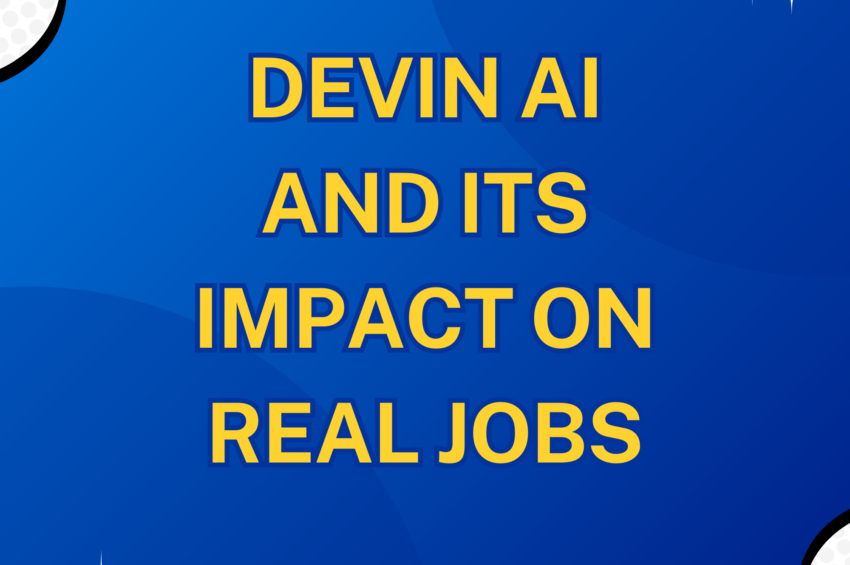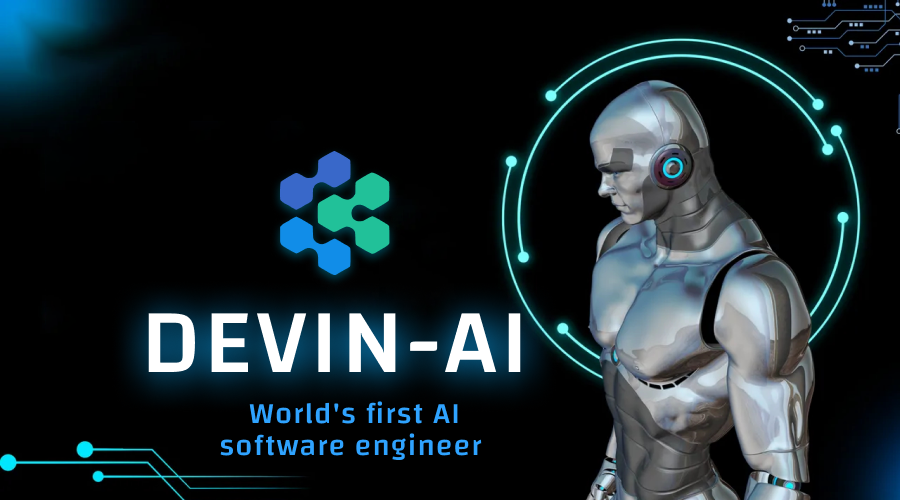
What Is Devin Ai and What Does It Do?

After ChatGPT made waves all over the world for its surprising generative AI capacity, a US-based company called Cognition has announced the launch of a new AI tool called Devin which it claims to be the world’s first fully autonomous AI software engineer which can write code with command prompts. It has triggered fears among the software community about its possible impact on tech jobs.
Devin’s ability to write code with command prompts has prompted discussions on its potential impact on current software jobs.
Devin isn’t just any software program, it is an amazing AI made by Cognition and led by Scott Wu. It can do coding, fixing errors, and even creating apps and websites. It’s a big step forward for AI in making software. Instead of taking jobs, Devin works with people to make them more productive. Also, it learns and gets better over time, changing how we do software work and bringing AI Software engineers and humans closer together. Here’s a quick look at what Devin can do for you:
Software Engineer as an AI: Devin AI software developer can code, test, as well as it can launch programs by himself in many different computer languages.
Adapting and Learning: It gets better and faster at its job with each project it works on.
Interaction with Humans: It is made to help human engineers, as well as make teams work better together.
Applications in Real-World: Devin has already proven himself in real projects. By doing tasks like making websites, and apps and also in software testing.
How Does Devin Work?

Devin AI uses natural language processing to understand text. It figures out the meaning, looks at the context, and gives a response that makes sense. It’s like a smart computer that learns from lots of examples to talk like a human. Also, this AI software engineer can do different things like answering questions or helping with language stuff. It also gets better over time with feedback and updates to work even smarter.
Devin’s Capabilities and Impact on Software Jobs
Devin AI, currently in the beta testing phase and available to select users in limited access, boasts a remarkable problem-solving capacity, with reported effectiveness in resolving a substantial percentage of software issues. The tool’s capacity to autonomously handle complex tasks, from writing code to fixing bugs and executing projects, has raised concerns regarding its potential to replace current software engineering roles.
Jaspreet Bindra, MD & founder of The Tech Whisperer, attested to Devin’s groundbreaking capabilities, highlighting its capacity to rapidly learn and utilize new technologies, build applications from scratch, identify and rectify bugs, and autonomously train AI models. While such capabilities have created a buzz within the fraternity, Devin is predominantly seen as an assistant rather than a direct competitor to software engineers.
The Role of AI in Software Development

Devin’s introduction comes at a time when the rapid growth of AI tools, such as GitHub Copilot, has already begun impacting software programming. However, it’s essential to note that Devin is positioned as a smart assistant that aims to make the job of software engineers easier, allowing them to focus on higher-level skills. Abhimanyu Saxena, co-founder of Scaler & InterviewBit, encourages software engineers to perceive these tools as enablers and swiftly build expertise in using them efficiently rather than viewing them as competitors.
Heena Kothari, senior director of engineering and product development at Exotel, emphasizes that while coding is a vital aspect of software development, there are other critical components, such as designing the software, ensuring compatibility with other systems, and understanding user interactions. She notes that Devin’s impact may be more prominent in simpler or medium-complexity software projects, enabling engineers to concentrate on solving significant challenges rather than routine tasks.
Future Prospects and Considerations
While there are concerns about the potential impact of AI tools like Devin on job security, it’s important to acknowledge that AI-assisted tools represent a significant leap in software development. As AI continues to be developed and adopted, its overall impact on employment, wages, growth, and equality remains to be fully realized. The current research suggests that AI-enabled technologies have led to the creation of more jobs, particularly for highly-skilled individuals, while having minimal impact on low and medium-skill jobs.
As Devin and similar AI tools continue to evolve, it’s essential to recognize their current limitations and best use cases. AI’s role in software development is expected to continue evolving, with the emphasis remaining on leveraging these tools as companions to enhance productivity and problem-solving capabilities rather than replacing the expertise of human developers.
In conclusion, while the emergence of AI tools like Devin has generated significant interest and concern within the software engineering community, their impact on current programmer jobs is likely to be more complementary than substitutional. As the industry navigates this paradigm shift, it’s crucial for software engineers to recognize and adapt to the evolving landscape of AI-assisted development tools.
The future of software development is poised to be shaped by a collaborative synergy between human expertise and AI innovation, ensuring the continued evolution and advancement of the industry.
ALSO READ- USE OF ARTIFICIAL INTELLIGENCE IN DIGITAL MARKETING
For More Information, watch this video- https://youtu.be/bkaRnJpzttA?si=ucfPCxZfRsqObUhM



